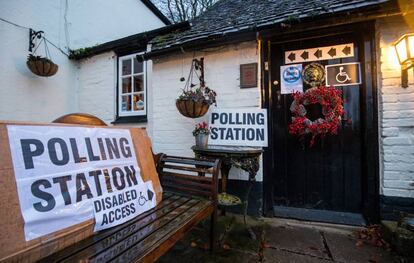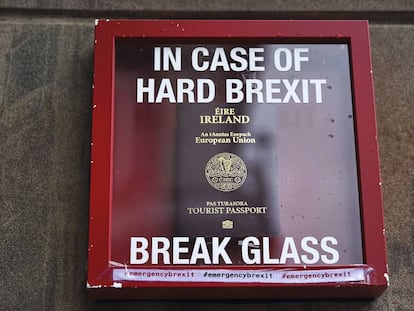Spaniards in the UK: “I have a Plan B but Britons are trapped if things don’t go well”
As the United Kingdom heads to the polls today, the Spanish community shares their concerns about how both the result and Brexit could affect their futures

They want to stay in the United Kingdom, they point to the contribution of Europeans to British prosperity and they fear Brexit more for its impact on the domestic economy than the possible effect the country’s departure from the European Union could have on their ability to stay in their adoptive home. The Spanish residents of the UK are as varied as the population they left behind, but what unites this diverse group are the challenges raised by Brexit and today’s general election, which they are observing both as witnesses and concerned parties.
The unexpected result of the June 23, 2016 Brexit referendum prompted the five phases of grief among the Spanish community in the UK, and today acceptance is the dominant emotion. But the political map that will likely be redrawn by today’s polls will have direct repercussions on their futures.
The unexpected result of the Brexit referendum prompted the five phases of grief among the Spanish community in the UK
“There will be a lot of simplification of ideas,” says Sergio del Cacho, originally from Zaragoza, and who moved to London in 2001 for a year of Erasmus study and ended up staying. The manager of a pub in the center of the capital, he says that the “polarization” in the country is not just limited to the second-biggest European economy, but rather “is present in all democracies, hence the rise of the far-right, which is related to Brexit here.”
The monopoly that the EU-UK divorce is having on the political and social debate constitutes a “double-edged sword,” according to Javier Domínguez, who has been working in the financial sector since the start of this decade. “People are burnt out, but the problem is that they will end up voting for the Conservatives just to resolve the situation. Brexit voters are still defending their position, and I understand that, but those on the other side of the spectrum are abandoning it, because they are fed up.” This impression is backed by the opinion polls, which are giving incumbent Prime Minister Boris Johnson the lead. His main campaign slogan ahead of today’s polls has been “Get Brexit Done.”
After 27 years in the UK and six general elections, Mariví Rodríguez says she feels “more concern than ever given the attitude of the political class and the division that they are trying to create.” The teacher at King’s College adds that “those of us who have been here for some time have seen the differences.” She criticizes the fact that the referendum result has left EU migrants in the country “in no-man’s land. It’s exhausting and it’s causing stress,” she says, something that could also be said of the effect that today’s elections are having on the 180,000 Spaniards resident in the UK.
The problem is that people will end up voting for the Conservatives just to resolve the situation
Javier Domínguez
The most recent figures, from October, reveal that the majority of these residents – 152,600 – have completed their applications for the so-called “settled status.” The figure represents the fifth highest from EU countries.
Bárbara Moledo, an account executive, left a steady job in A Coruña, Galicia in 2015 in order to move to the UK, knowing that the referendum would take place. She points to the “peace of mind” that the settled-status procedure has meant for her, since it was put in place in March. “It’s for your own benefit,” she says. “So that you are covered.”
In contrast to the criticism of the EU registration process that has been seen on platforms that campaign to protect citizens’ rights, she believes that the mechanism “makes sense, above all else, to calm people down,” given the apparent inevitability of Brexit. Others, such as Virginia Marugán, have gone a step further and have already secured double nationality. A researcher from the Royal Veterinary College, she says that her decision was not so much about the referendum result, but rather to avoid “discriminatory situations” and the “sensation of constant justification.”
I don’t know what kind of quality of life there will be after Brexit
Virginia Marugán
Despite the general plan being to stay put in the UK, the major concern is about how Brexit will affect the British economy. As a City analyst, Javier Domínguez characterizes the situation as “a problem they sought out,” and one that continues to provoke “a mix of feelings to say… why?” Virginia agrees with this. “I never thought that Brexit would be a setback for me because they would throw me out of the country, or I would lose my job… But I don’t know what kind of quality of life there will be [after Brexit],” she adds.
Like other EU citizens, however, she says that she has an “advantage” compared to the natives: “I have a Plan B, I have an EU passport, and I can go to 27 different countries,” she says. “Those who are here will be trapped if things don’t go well.”
That back-and-forth characterizes the experience of Inés De Sande, who is originally from Extremadura. A social educator, she has spent 13 years in Scotland, albeit not consecutively. The “rejection” that she says she felt in 2016 prompted her to leave, “as it did a lot of people,” she explains.
“It broke my heart, I just couldn’t make sense of it,” she says, admitting that in Scotland, where 62% of voters opted to remain in the EU, they made her “feel welcome.” Since her return a year ago, mostly for professional reasons – “Things are not going well in Spain” – she has discovered something about the market in the wake of the referendum. “I haven’t had a single problem on the basis of being European, nor has anyone ever asked me if I had completed the process for staying.”
This apparently relaxed approach has, they believe, a lot to do with the British model of productivity, which, Sergio argues, “is fueled by immigration.” “Europeans come here to work and contribute with their taxes, they are not a burden,” says Bárbara. The reality of the situation three-and-a-half years after the referendum appears to support this, as Virginia explains. “The model of EU immigration was never set out, it was a manipulation,” she says. “After the referendum, they have said to nearly all Europeans, ‘It wasn’t because of you, it wasn’t because of people like you’.”
English version by Simon Hunter.
Tu suscripción se está usando en otro dispositivo
¿Quieres añadir otro usuario a tu suscripción?
Si continúas leyendo en este dispositivo, no se podrá leer en el otro.
FlechaTu suscripción se está usando en otro dispositivo y solo puedes acceder a EL PAÍS desde un dispositivo a la vez.
Si quieres compartir tu cuenta, cambia tu suscripción a la modalidad Premium, así podrás añadir otro usuario. Cada uno accederá con su propia cuenta de email, lo que os permitirá personalizar vuestra experiencia en EL PAÍS.
En el caso de no saber quién está usando tu cuenta, te recomendamos cambiar tu contraseña aquí.
Si decides continuar compartiendo tu cuenta, este mensaje se mostrará en tu dispositivo y en el de la otra persona que está usando tu cuenta de forma indefinida, afectando a tu experiencia de lectura. Puedes consultar aquí los términos y condiciones de la suscripción digital.









































